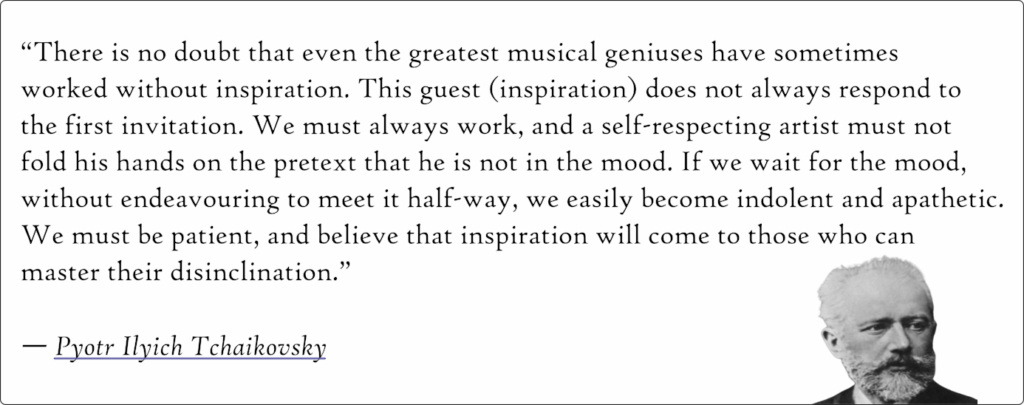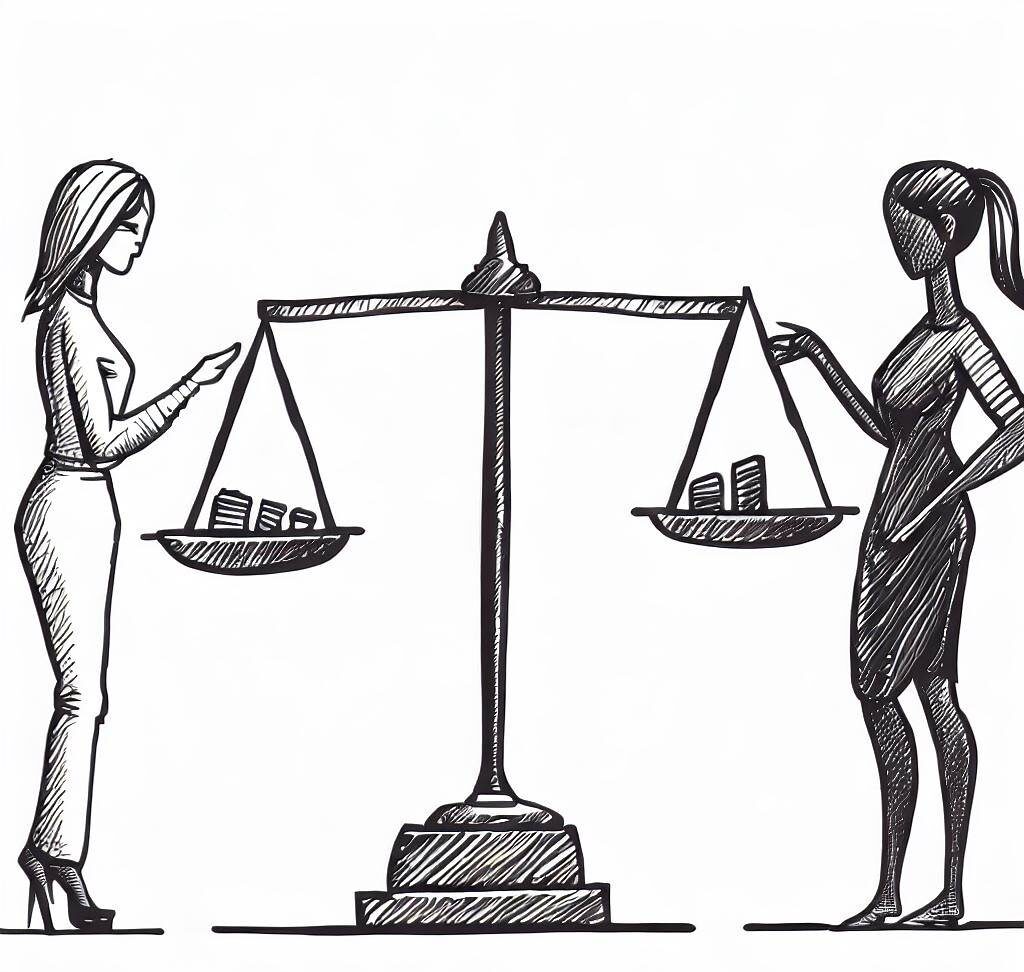Don’t forget that the act of creating a story, design, or art does not solely rely on simple inspiration. Inspiration is only 1% of the puzzle, yet it’s immediately the most important.
When inspiration does not come…
When you’re eager to get started, it can be incredibly frustrating when you seem to go hours without getting any good ideas. You make a beginning, only to start over again and make no progress. You scrape the bottom and become irritated. Why is it so difficult?
This article doesn’t provide some quick tips for more inspiration, like suggesting that you should sleep better or meditate to let inspiration flow. It’s important to gain a deeper understanding of how inspiration actually works.
Why do you feel uninspired and how much influence you have over it. It has nothing to do with a lack talent or that you are not good enough.
1. Be Easy, Let Inspiration Come To You
Because the harder you search for it, the more difficult it will be to find inspiration.
Think of inspiration as a person who arrives when you start working. Sometimes, it takes time before you get that spark and can build upon it. To reach that state of calm and relaxation, it is important that you recognize what frustrates you and how it actually hinders your inspiration.
Tchaikovsky, one of the most famous classical composers, even said,

If you are a creative person, you can sometimes become so frustrated when you can’t shape your creativity well. Every idea seems like a bad idea, and you start over several times in the hope that decent inspiration will come now.
2. Expectations Of Your Own Creative Process
If you think back, there may have been days when all creativity flowed effortlessly. New ideas came to you easily. Now, if you feel completely empty, you long for those times when creativity overflowed within you. Could something have changed? Or perhaps you think it will never come again and the muses have abandoned you. It’s actually different.
Creating is not really ‘creating’, but sculpting the idea.
Having spontaneous ideas is often the beginning of the creative process, but expecting everything from it can sometimes work against you. As a creator, it’s about sculpting an idea. Generating multiple options and selecting the one that fits best. Here, inspiration also plays a role.
See the spark of inspiration as a seed that needs to grow. It requires your own effort to make something substantial out of it:
- knowing your craft well
- striving for it/hard work
- relaxed mood
- a clear vision
- consistency
Even famous artists were not satisfied with their most famous paintings. This is one of the enduring dilemmas for most creators and writers. That there can always be adjustments or changes afterwards.
3. The Bad Idea-Myth

Perhaps you feel uninspired, but you actually are not. You are probabaly overflowing with ideas, but they don’t meet your high expectations. If you have a specific idea of how ideas and insights should come to you, you will reject them or judge them as bad ideas.
You feel enthusiastic when an idea comes to you. Afterwards, when you take a closer look at it, the feeling you initially had disappears, and you quickly reject it as a bad idea. Know that these sparks of inspiration are seeds that need to be evolved in the creative process. If an early inspiration is rejected from the beginning, it loses its potential to grow and change at a later moment.
Why there are no bad ideas
Again, there are no bad ideas. They may be unrealistic or harmful, but they always have the potential to become something. Every idea that comes to you first goes through a judgment in your mind. It determines whether it already meets everything it should ever become. Remember that this inspiration is just a starting point for what the final outcome will be. Know that everything that comes to you can still be changed later.
If you can recognize and overcome this blockage, half of the problem of feeling uninspired will already be solved.
This is THE exercise to always have inspiration:
4. Get Comfortable Creating
Ask yourself this question:
Do you only start working when you’re certain that you have some inspiration, or do you start working and let inspiration accompany you?
You don’t have to wait for inspiration before you can begin. This can be quite thrilling because your idea is not yet substantial or fixed. It is completely intuitive and based on feeling. Starting without inspiration does, however, allow you to make the act of writing, editing, or painting your own and learn to work without waiting for that spark of inspiration. It depends on many factors, and it may take some time before good ideas come.
The moment when inspiration comes cannot be captured. It can come in a moment or last for a much longer period. What is clear, though, is that starting and giving inspiration a chance to join in is one of the best ways to let your creativity flow.
5. Brainstorming
If you feel you are uninspired because you don’t have a clue what you want to create, a brainstorm can greatly help you get started. You focus on possible ideas that you want to incorporate into your work. It’s a list of quick, potential ideas that you can later develop if you wish.
Give yourself 10 minutes, or longer, to write down everything that comes to mind. This can help you get started:
- which colors do I want to use?
- where does it take place?
- what vibe(s) should it evoke? (melancholic, bold, elegant, etc…)
- what makes this work different?
- Does the story/art contain persons, a main character?
- Endless possibilities!
There are many more questions you can ask yourself to get that inspiration flowing. Remember that this is just a starting point before you dive into the work. It helps you get started and develop ideas.
6. Comparison Is The Thief Of Life

If there’s something that can bind you as a creator, it’s comparing yourself to others. It’s so easy to do and sometimes gets in the way of our entire creative process. Others always seem to be slightly better or more original than you. You’ll notice after a period that these thoughts will get you nowhere.
Don’t compare your ‘way of inspiration’ to that of others. Every creator is unique and expresses their creativity in their own way. Some never experience writer’s block, while others do on a daily basis or for longer periods. This says absolutely nothing about the quality of the work, but rather about the quantity.
The solution is to know that what you have to say is truly valuable. And accept the fact that there are indeed people with the same passion who, in your eyes, are better and more original. The best thing to do is to admire these people and perhaps use them as inspiration.
Don’t compare yourself to others who have 10 years more experience than you. Because everyone’s creativity is so unique, it’s important for everyone to develop it to the best of their ability.
Even those great artists you may look up to also experience ‘feeling uninspired’ at times and the insecurity of not being good enough.
7. Learn Your Craft Well
Do you want to write but can’t find the words? Or do you feel like you’re lacking certain techniques? This doesn’t necessarily have much to do with feeling uninspired. To fully unleash inspiration, when it does come, it’s important that you can immediately express it by knowing your craft well.
Know how to find the right words, how to use a computer program or software. To ensure that technical issues do not hinder, it has a tremendous influence on the “flow” of inspiration that can come smoothly.
This applies to every talent and activity. This takes time and practice, practice, and practice.
8. Too Many Ideas?
Do you know that feeling? You’re going full steam ahead, and you can’t even keep up with your own mind. You get new ideas quickly, but it also fades away quickly. This has to do with your enthusiasm and the fact that your brain provides a lot of scattered insights. It is useful to jot down your ideas briefly and not immediately elaborate on them. Having too many good ideas can hinder your creative process and cause writer’s block in that way.
You have a tendency to want to develop them all, and this can overwhelm you. It can create a wide range of possibilities that make it even more challenging.
Having too many ideas can also be a good thing, if that’s your intention. Think of highly intricate and defined artworks or musical compositions. Some consist of hundreds of different elements and small creations. This is a style you can embrace, but you need to consider if it’s the right approach for you.
9. Feeling Overstimulated And Bored
Especially as a creative person, you may be highly sensitive or prone to overstimulation. Everything around you can be converted into creativity, and that often goes hand in hand with being highly sensitive. Do you often find yourself overstimulated or tired after busy days?
Some creators actually use inspiration and creativity as an outlet to relieve their overstimulation. It brings them peace and allows them to clear their minds. But if it requires a lot of effort, such as writing, painting, or dancing, it can be more challenging. Again, everyone is different in this aspect.
10. Actually Finishing A Work…
That initial spark of inspiration is so delightful. It comes at the right moment, and in the beginning, you make great leaps in your work. But then, when that wave of enthusiasm subsides, more effort is required. All the building blocks you have must now be shaped and put together.
In the world, there may be more unfinished books, songs, and paintings than the ones we see in museums and bookstores.
The discipline needed to bring an idea to completion is a craft in itself. You really have to push yourself and be willing, even when inspiration has flown away, to finish your potential work.
Something is only finished when you think there is nothing more to add. If anything you add detracts from the work, then it’s already finished.
Inspiration Is Mysterious
There will be days when the muses do not accompany you and assist you in your creative process. Inspiration remains a fascinating but mysterious phenomenon. Sometimes it is present in all its fullness, and often it disappears in a split second.
With the advice in this article, you will certainly make progress on the path to creative inspiration. Be easy and let it come to you!
